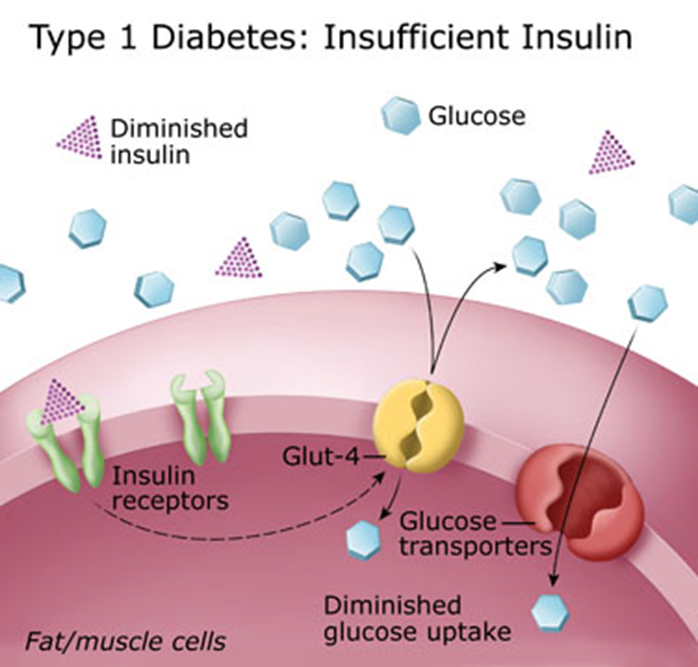A glucagon emergency kit is prescribed for a client with type 1 diabetes mellitus. When should the nurse instruct the client and family that glucagon needs to be administered?
If severe hypoglycemia occurs.
Before meals to prevent hyperglycemia.
When unable to eat during sick days.
At the onset of signs of diabetic ketoacidosis.
The Correct Answer is A
Choice A Reason:
Glucagon is a hormone used to treat severe hypoglycemia (low blood sugar) in individuals with diabetes. Severe hypoglycemia can be life-threatening and requires immediate treatment to raise blood sugar levels. Glucagon works by stimulating the liver to release stored glucose into the bloodstream. It is crucial for clients and their families to recognize the signs of severe hypoglycemia, such as confusion, unconsciousness, or seizures, and to administer glucagon promptly.

Choice B Reason:
Administering glucagon before meals to prevent hyperglycemia is incorrect. Glucagon is not used to prevent high blood sugar levels; it is specifically used to treat low blood sugar levels. Preventing hyperglycemia typically involves insulin administration and dietary management, not glucagon.
Choice C Reason:
While managing blood sugar levels during sick days is important, glucagon is not used for this purpose. Clients are usually advised to monitor their blood sugar levels more frequently and adjust their insulin doses as needed during illness. Glucagon is reserved for emergency situations involving severe hypoglycemia.
Choice D Reason:
Glucagon is not used to treat diabetic ketoacidosis (DKA). DKA is a serious complication of diabetes that requires immediate medical attention and is treated with insulin, fluids, and electrolytes. Administering glucagon would not address the underlying issues of DKA and could potentially worsen the condition.
Nursing Test Bank
Naxlex Comprehensive Predictor Exams
Related Questions
Correct Answer is D
Explanation
Choice A Reason:
Polyuria, or excessive urination, is a symptom of diabetes insipidus rather than a side effect of vasopressin. Vasopressin is used to reduce urine output in DI patients. If polyuria persists, it may indicate that the medication is not effective, but it is not a direct side effect that requires immediate reporting.
Choice B Reason:
Low urine specific gravity indicates dilute urine, which is a characteristic of diabetes insipidus. Vasopressin should help concentrate the urine. If low urine specific gravity persists, it may suggest that the medication is not working effectively, but it is not a side effect that necessitates urgent reporting.
Choice C Reason:
Polydipsia, or excessive thirst, is another symptom of diabetes insipidus. While vasopressin should help reduce this symptom by controlling urine output, persistent polydipsia may indicate inadequate treatment. However, it is not a side effect of the medication that requires immediate attention.
Choice D Reason:
Worsening headache is a significant side effect that should be reported to the healthcare provider. Headaches can indicate water intoxication or hyponatremia (low sodium levels), which are serious complications of vasopressin therapy. Immediate reporting is necessary to adjust the treatment and prevent further complications.
Correct Answer is D
Explanation
Choice A Reason:
Avoiding taking allopurinol on an empty stomach is a common recommendation to prevent stomach upset. Taking the medication with food can help reduce gastrointestinal discomfort, making this advice appropriate and not requiring additional instruction.
Choice B Reason:
Consuming 2 liters of water daily is advised when taking allopurinol to help prevent kidney stones and ensure proper hydration. Adequate fluid intake helps to dilute the urine and reduce the risk of uric acid crystal formation, making this advice correct and not needing further instruction.
Choice C Reason:
Reducing caffeine and acidic intake can be beneficial for individuals taking allopurinol, as these substances can increase uric acid levels and potentially exacerbate gout symptoms. This advice is appropriate and does not require additional instruction.
Choice D Reason:
Doubling the dose if a dose is missed is incorrect and potentially dangerous. Allopurinol should be taken exactly as prescribed, and doubling up on doses can increase the risk of side effects and toxicity. If a dose is missed, the client should take it as soon as they remember, but if it is almost time for the next dose, they should skip the missed dose and continue with their regular schedule. This instruction requires correction by the nurse.
Whether you are a student looking to ace your exams or a practicing nurse seeking to enhance your expertise , our nursing education contents will empower you with the confidence and competence to make a difference in the lives of patients and become a respected leader in the healthcare field.
Visit Naxlex, invest in your future and unlock endless possibilities with our unparalleled nursing education contents today
Report Wrong Answer on the Current Question
Do you disagree with the answer? If yes, what is your expected answer? Explain.
Kindly be descriptive with the issue you are facing.
